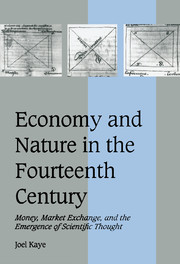 Economy and Nature in the Fourteenth Century
Economy and Nature in the Fourteenth Century Book contents
- Frontmatter
- Contents
- Acknowledgments
- INTRODUCTION
- 1 THE ECONOMIC BACKGROUND: MONETIZATION AND MONETARY CONSCIOUSNESS IN THE THIRTEENTH AND FOURTEENTH CENTURIES
- 2 THE ARISTOTELIAN MODEL OF MONEY AND ECONOMIC EXCHANGE
- 3 THE EARLIEST LATIN COMMENTARIES ON THE ARISTOTELIAN MODEL OF ECONOMIC EXCHANGE: ALBERTUS MAGNUS AND THOMAS AQUINAS
- 4 MODELS OF ECONOMIC EQUALITY AND EQUALIZATION IN THE THIRTEENTH CENTURY
- 5 EVOLVING MODELS OF MONEY AND MARKET EXCHANGE IN THE LATE THIRTEENTH AND FOURTEENTH CENTURIES
- 6 LINKING THE SCHOLASTIC MODEL OF MONEY AS MEASURE TO PROTO-SCIENTIFIC INNOVATIONS IN FOURTEENTH-CENTURY NATURAL PHILOSOPHY
- 7 LINKING SCHOLASTIC MODELS OF MONETIZED EXCHANGE TO INNOVATIONS IN FOURTEENTH-CENTURY MATHEMATICS AND NATURAL PHILOSOPHY
- Bibliography
- Index
- Cambridge Studies in Medieval Life and Thought Fourth series
4 - MODELS OF ECONOMIC EQUALITY AND EQUALIZATION IN THE THIRTEENTH CENTURY
Published online by Cambridge University Press: 16 July 2009
- Frontmatter
- Contents
- Acknowledgments
- INTRODUCTION
- 1 THE ECONOMIC BACKGROUND: MONETIZATION AND MONETARY CONSCIOUSNESS IN THE THIRTEENTH AND FOURTEENTH CENTURIES
- 2 THE ARISTOTELIAN MODEL OF MONEY AND ECONOMIC EXCHANGE
- 3 THE EARLIEST LATIN COMMENTARIES ON THE ARISTOTELIAN MODEL OF ECONOMIC EXCHANGE: ALBERTUS MAGNUS AND THOMAS AQUINAS
- 4 MODELS OF ECONOMIC EQUALITY AND EQUALIZATION IN THE THIRTEENTH CENTURY
- 5 EVOLVING MODELS OF MONEY AND MARKET EXCHANGE IN THE LATE THIRTEENTH AND FOURTEENTH CENTURIES
- 6 LINKING THE SCHOLASTIC MODEL OF MONEY AS MEASURE TO PROTO-SCIENTIFIC INNOVATIONS IN FOURTEENTH-CENTURY NATURAL PHILOSOPHY
- 7 LINKING SCHOLASTIC MODELS OF MONETIZED EXCHANGE TO INNOVATIONS IN FOURTEENTH-CENTURY MATHEMATICS AND NATURAL PHILOSOPHY
- Bibliography
- Index
- Cambridge Studies in Medieval Life and Thought Fourth series
Summary
As important as Aristotle's economic ideas were to the formulations of Albert, Aquinas, and succeeding masters at Paris and Oxford, they constituted only a part of the textual inheritance on economic questions. In Aquinas' most thorough discussion of usury and just price in the Summa theologiae, Aristotelian insights from the Ethics and the Politics shared place with citations from the Bible, patristic authorities, post-patristic theological writings, Roman authors, and, importantly, Roman law and canon law. In varying degrees scholastic perceptions of money and market exchange were influenced by all these textual traditions.
In addition, scholastic economic thought was strongly influenced by its Christian setting – what its continuators took as their responsibility for the care and protection of souls. Economic determinations were tied not only to legal and ethical considerations but to the individual and his salvation. The primary question scholastic thinkers asked concerning economic activity was not “how does it work?,” but “what is permitted and what is not? what is sinful and what is not?” Economic positions were often justified on moral grounds and framed in terms of the moral duty to protect the weak and to enforce economic justice.
Religious, legal, and ethical principles defining economic liceity were in turn tied to conceptions of the “natural order” of things and to Nature itself. Scholastic authors consistently defined usury not only as unethical but as “unnatural.”
- Type
- Chapter
- Information
- Economy and Nature in the Fourteenth CenturyMoney, Market Exchange, and the Emergence of Scientific Thought, pp. 79 - 115Publisher: Cambridge University PressPrint publication year: 1998


